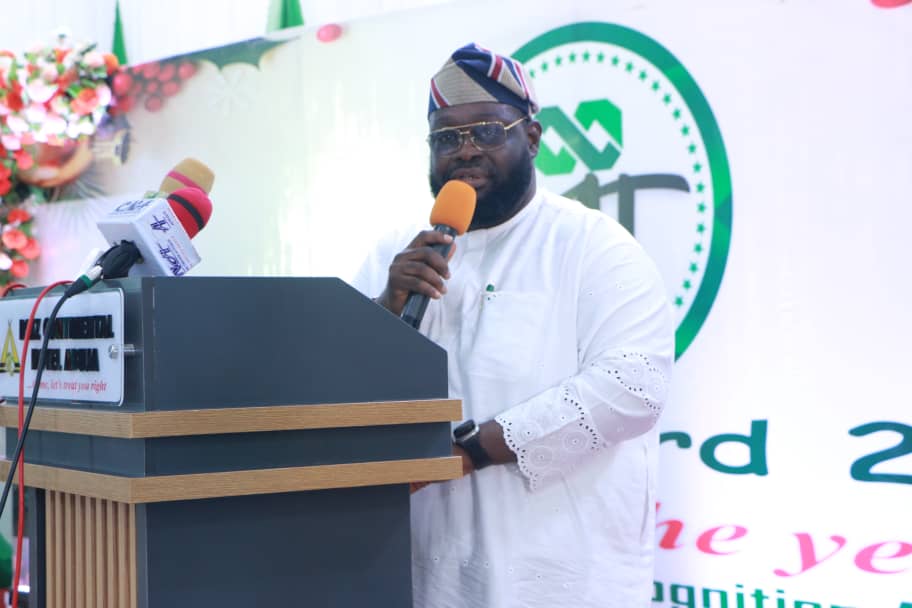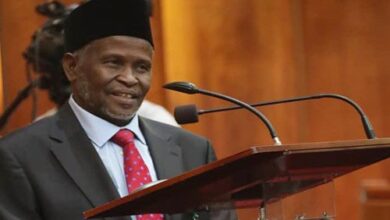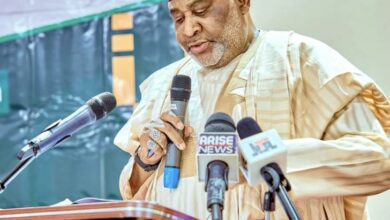A cursory assessment of the administration of Dr. Orji Ogbonnaya Orji so far as the Executive Secretary of the Nigeria Extractive Industries Transparency Initiative (NEITI), shows a commendable leadership.
Nigerians reposed so much hope and trust in the media Czar, considering his touted professionalism, and he has not disappointed.
NEITI, the key Anti-Corruption Agency at the Presidency was established in 2004 with the mandate to enthrone transparency, accountability, and governance of the country’s oil, gas and mining industries.
Dr. Orji was appointed by the former President Mohammadu Buhari on February 18, 2022 to head NEITI for a single term of five (5) years in accordance with the provision of Section 12 (2) (a) and 6 (3) of the NEITI (Establishment) Act, 2007.
Prior to his appointment, Dr. Orji was the Agency’s Director of Communication and Advocacy.
He began his career at the Federal Radio Corporation of Nigeria (FRCN) and also worked with the United Nations Development Programme (UNDP) where he managed several donor-funded projects.
On assumption of office as the Executive Secretary of NEITI, Dr. Orji and the current management inherited an institution at a crossroads. NEITI was grappling with serious operational, institutional, and governance challenges that threatened its effectiveness.
These included: The absence of a functional National Stakeholders Working Group (NSWG)-a key requirement for sustaining Nigeria’s membership in the global Extractive Industries Transparency Initiative (EITI), The threat of eviction from a rented office space, An aging, top-heavy, and disoriented workforce in urgent need of revitalization, financial constraints, stakeholder apathy, weak institutional capacity, and Poor program content, policy focus, and declining public confidence.
Beyond these internal challenges, the global extractive industry was undergoing rapid transformation. Issues such as energy transition, beneficial ownership transparency, contract disclosure, and the implementation of Nigeria’s Petroleum Industry Act (PIA) were reshaping the sector.
NEITI needed to adapt—not just to remain relevant but to lead the charge for greater accountability in extractive governance.
Faced with these realities, Dr. Orji and his top management pursued a deliberate strategy to reposition NEITI as a stronger, independent, and globally respected transparency institution.
ACHIEVEMENTS
His doggedness to achieve results pushed him to improve the scope, quality, and timeliness of the agency’s reports; expanding it to include beneficial ownership, contract transparency, and environmental impacts.
He reconstituted the NEITI NSWG, ensuring high-level leadership, making it the only Federal Board chaired by the Secretary to the Government of the Federation (SGF), and strengthening collaboration with oil, gas, and mining companies, reviving and reconstituting the NEITI-Companies Forum to enhance industry engagement.
Dr. Orji and his team deepened engagement with civil society organizations (CSOs) to empower citizens to monitor and demand accountability, allowed the CSOs to independently elect their NSWG representative, ensuring legitimacy and inclusivity.
He took a bold and commendable step by securing a permanent office and relocated the staff to a conducive and professional work environment. He prioritized staff training, capacity building, and leadership transformation to improve institutional effectiveness.
He recruited young, skilled professionals to address manpower gaps and drive NEITI’s growth plan.
Under his leadership, with funding from DFID-FOSTER, NEITI developed a comprehensive Five-Year Strategic Plan (2022–2026) that serves as a roadmap for the agency’s goals, annual work plans, and budgets. As the plan nears completion in 2026, he recommended an immediate review to ensure continuity and relevance.
Dr. Orji and the team also establish NEITI Data Centre, a strategic initiative designed to centralize and automate extractive sector data, ensuring open access to industry information.
The Data Centre is expected to serve as a one-stop hub for extractive industry data, enhance public access to information for research, advocacy, and policy development, and support systematic disclosures in line with the EITI 2023 Standards.
In May 2024, after seven years of inaction, Dr. Orji pushed for the reconstitution of the Inter-Ministerial Task Team (IMTT), responsible for implementing NEITI’s report recommendations. Membership was upgraded to Director-level representation, strengthening its decision-making and policy implementation capacity.
NEITI has strengthened Nigeria’s Anti-Corruption Agenda, as the agency currently chairs the Inter-Agency Task Team (IATT), which coordinates 21 anti-corruption agencies at the federal level.
The agency has expressed determination to strengthen transparency in oil and gas divestments, by expanding industry reports to include dedicated sections on divestments, strengthening collaboration with NUPRC and NNPC Ltd. to ensure full disclosure of financial, social, and environmental aspects of divestments, and promote greater public awareness and engagement in asset transfers.
It is also determined to ensure transparency in Forward Sales of Oil & Gas by intensifying collaboration with NNPC Ltd. and other government agencies to disclose forward sales data.
NEITI said that oil and gas companies must be held accountable for clean-up costs and remediation efforts, therefore, it would work with the NUPRC and the Ministry of Environment to ensure transparency in environmental remediation funds.
It said it committed to exposing hidden ownership structures to combat corruption, and would obtain updated beneficial ownership data from the Corporate Affairs Commission (CAC) and publish disclosures on companies acquiring divested assets.
Dr. Orji disclosed that the agency’s reporting framework would be expanded in the 2024 Oil, Gas, and Solid Minerals Reports to address forward sales and pre-export financing transactions, environmental remediation funds and asset divestments, and revenue tracking and fiscal accountability.
MOVING FORWARD
He said while the leadership has made remarkable progress, the challenges remain. Therefore, institutional constraints, funding limitations, and resistance to change must be continuously addressed.
The NEITI boss said greater efforts would be deployed to deepen beneficial ownership disclosures, strengthen revenue tracking and contract transparency, and ensure full implementation of extractive sector governance reforms.
He called on all the relevant stakeholders to collaborate with the agency for a more transparent, accountable, and just extractive sector in Nigeria






